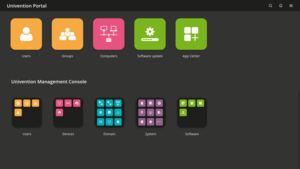Univention Corporate Server

Overview page of the Univention Management Console, the web-based management interface of UCS
|
|
| Developer | Univention GmbH |
|---|---|
| Written in | Python (mainly) |
| OS family | Linux |
| Working state | Current |
| Latest release | 4.1-4 / November 8, 2016 |
| Update method | APT (several front-ends available) |
| Package manager | dpkg |
| Platforms | i386, AMD64 |
| License | AGPL |
| Official website | UCS |
Univention Corporate Server (UCS) is a server operating system derived from Debian GNU/Linux with an integrated management system for the central and cross-platform administration of servers, services, clients, desktops and users as well as virtualized computers operated in UCS. In addition to the operation of local, virtual instances, UCS can also be operated in OpenStack-based, Microsoft Azure-based and Amazon EC2-based cloud environments. Via the integration of the open source software Samba 4, Univention also supports the functions provided in many companies by Microsoft Active Directory for the administration of computers operated with Microsoft Windows. UCS-based components and UCS-certified, established third party products can be installed and integrated via the Univention App Center. UCS provides all App Center applications with a runtime environment and services for the operation including a central, consistent management of the apps. Docker containers can also be run on UCS systems and several of the apps available in the App Center are Docker-based.
Univention is a member of the Open Source Business Alliance and supports the creation of the Open Source Business Alliance open source software stacks.
The impulse for the development of UCS, which began in 2002, was the lack of a standardised Linux server operating system offering companies and organisations an alternative to Microsoft’s domain concept with the proprietary directory service Active Directory. Comparable Linux solutions (e.g., from SUSE and Red Hat) did not offer an integrated, cross-system user and computer management system, with the result that corresponding solutions had to be configured and maintained individually.
Important early driving forces for the development of UCS were initially the Oldenburgische Landesbank and the department of the Bremen Senator for Education and Science, until the product was ready for market launch at the end of 2004. Since then, in addition to new versions, a number of software solutions based on the main product UCS have also been launched.
...
Wikipedia
